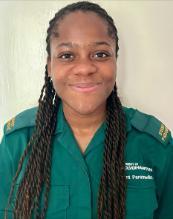This 3-year full-time course is designed to equip students with the essential knowledge, practical skills and professional behaviours for a rewarding and lifelong career as a Paramedic. The University of Wolverhampton has been providing undergraduate Paramedic Science programmes since 2014 and you will be taught not only by Paramedics, but also by other subject matter experts (E.g. Midwives). We are a passionate and highly experienced teaching team who are ready to prepare you for a career as a Paramedic.
The course is fully accredited by the Health and Care Professions Council (HCPC) and is run in partnership with West Midlands Ambulance Service. You will be allocated an experienced mentor, and you will undertake supernumerary shifts responding to 999 calls across the region. This will give you the opportunity to assess and treat patients whilst being supported by a qualified clinician. You may also have the opportunity to undertake a specialist placement in a setting such as the emergency department, operating theatre, coronary care unit, maternity unit, minor injury unit or a healthcare facility within a prison.
Throughout your journey, you will undertake theory modules to provide you with the foundational knowledge and academic skills required to function as a contemporary Allied Health Professional, but you will also spend lots of time in our state-of-the-art clinical skills labs learning the practical skills necessary to work as a Paramedic. We utilise our SUCCESS (Service User and Carer Involvement) team to aid clinical skills teaching and they have real life experience of accessing emergency care and enable you to understand the patient’s perspective. More details can be found on this Success page.
We are incredibly proud of our diverse cohorts who come to the university from a variety of backgrounds and bring with them a wealth of experience. We particularly welcome applications from mature applicants, those who may have been out of education for a while, and individuals from under-represented groups. Our course operates a guaranteed interview scheme, and we will guarantee an interview to all applicants who meet our minimum entry requirements and UCAS tariff. Once qualified, our Graduate Paramedics are highly sought after by employers, and whilst many choose to join an NHS ambulance service when they graduate, other options may be available to you.


/prod01/wlvacuk/media/departments/digital-content-and-communications/images-18-19/iStock-163641275.jpg)
/prod01/wlvacuk/media/departments/digital-content-and-communications/images-2024/250630-SciFest-1-group-photo-resized-800x450.png)
/prod01/wlvacuk/media/departments/digital-content-and-communications/images-18-19/210818-Iza-and-Mattia-Resized.jpg)
/prod01/wlvacuk/media/departments/digital-content-and-communications/images/Maria-Serria-(teaser-image).jpg)
/prod01/wlvacuk/media/departments/digital-content-and-communications/images-2024/241014-Cyber4ME-Project-Resized.jpg)
/prod01/wlvacuk/media/departments/digital-content-and-communications/images-18-19/210705-bric_LAND_ATTIC_v2_resized.jpg)
/prod01/channel_24/courses/media/departments/faculty-education-health-and-wellbeing/images/processed-5297863D-1399-45B4-B1EC-5DCE455922F5.jpg)

